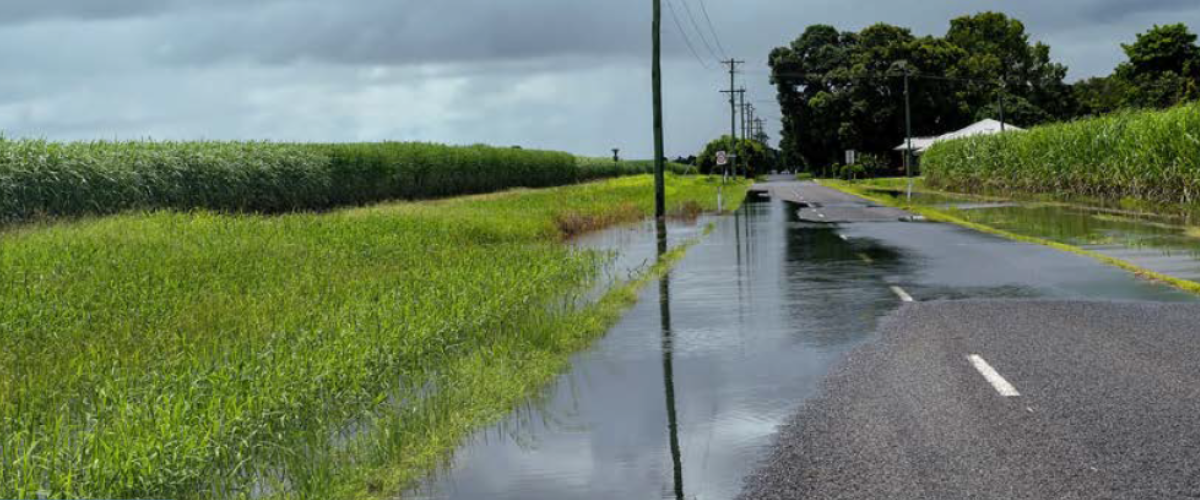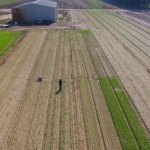
Recapturing water and nutrients on WA’s deep sands
28 May 2025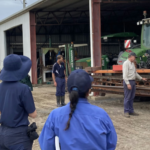
Cultivating success: insights from the Soil Field Walk in Bundaberg
28 May 2025VegNET Far North Queensland Regional Update
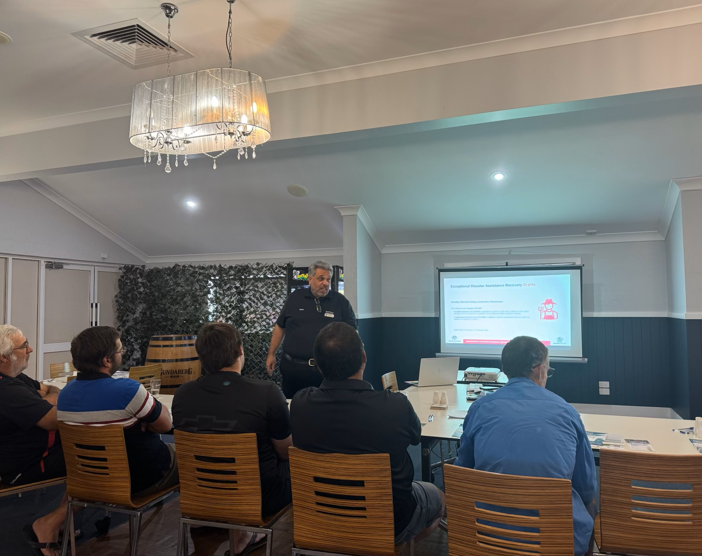
Angelo Rigano (QRIDA) talking to Burdekin growers about the disaster recovery assistance grants available following the NQ region flooding events
 In March this year, Bowen Gumlu Growers Association (BGGA) co-hosted two events in two locations to cover an assortment of important topics. These ‘Timely Topics’ sessions are the first in what will hopefully become a series that enable growers to get together, get the information they need at that time, and get on with their week.
In March this year, Bowen Gumlu Growers Association (BGGA) co-hosted two events in two locations to cover an assortment of important topics. These ‘Timely Topics’ sessions are the first in what will hopefully become a series that enable growers to get together, get the information they need at that time, and get on with their week.
These sessions were two to three hours long, so only took up an afternoon, but each session covered four important topics delivered by speakers in a streamlined and to-the-point fashion.
It seems that primary producers are being saturated with meeting requests from industry bodies, government departments, and agronomists. Little time and a lot of meeting requests mean growers are finding it increasingly difficult to get to all meetings and events, and are likely missing important industry messages and updates.
BGGA sees collaboration among industry representatives to be the most efficient way forward, and will hopefully result in more growers and industry reps attending. The idea is fewer events to attend, but more important topics covered in each session.
Wednesday’s session in Bowen included Noel Ainsworth from DPI talking about carbon in the ag economy, the future of carbon sequestration, and what carbon credits mean for growers and suppliers. A large and complicated topic, Noel brought the important points to light and helped growers better understand their role in the carbon credits scheme.
Noel was also able to answer questions from the attendees and provided handouts and links to videos and further information. Having Noel attend was also a good guide for grower groups to understand what parts of the carbon conversation growers want to explore further or what they found confusing, so a worthwhile follow-up session can be organised in the future.
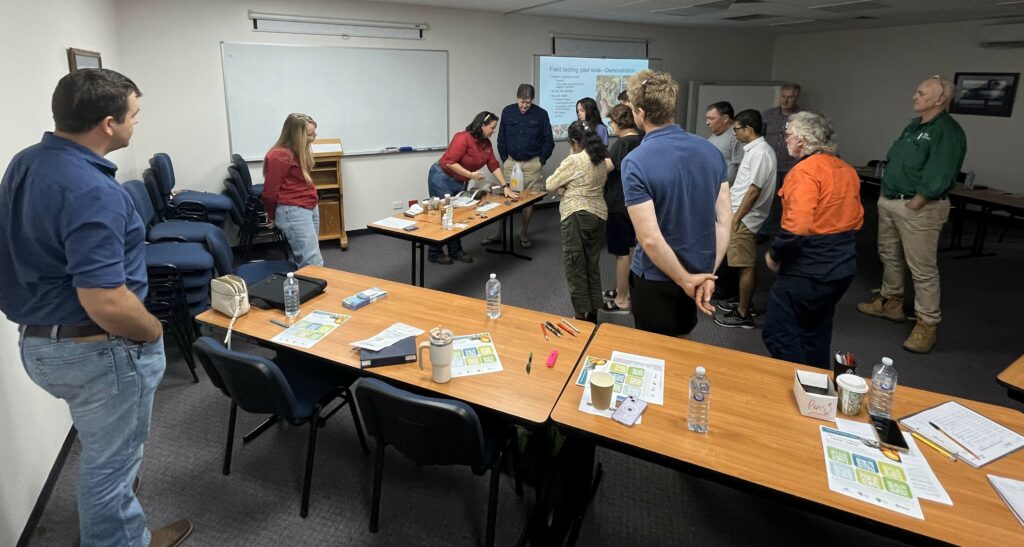
Billie White (Farmacist) gave an introduction on soil health, soil characteristics, and demonstrated how to determine soil structure including slaking and dispersion tests as part of the water quality project WaterWise Together.
The second presenter was Billie White, an agronomist who specialises in soil science from Farmacist, an independent sugarcane agronomy firm in North Queensland. Billie came as a BGGA guest presenter to explain how soil characteristics and composition determine how it behaves in relation to wet weather and erosion.
This segment was part of our WaterWise Together project that looks at how reducing sediment loss from erosion can benefit growers and improve reef water quality by reducing sediment runoff. It follows on from last year’s workshop on the benefits of cover cropping for soil retention and health.
Billie provided a practical demonstration of slaking and dispersion, and how soils respond differently under different conditions (pH levels, sodicity and salinity, and by different compositions). This is particularly important not only for reducing sediment loss, but also for understanding how the soil in a particular paddock will influence how water and nutrients are taken up by the plant, which
means fertiliser choice and application, and chemical choice and application can be altered to get the most efficient and effective result. This workshop provided an important introduction to soils that will be built upon later in the year with another deep-dive – literally – into soil health with a soil pit and soil health workshop.
Kristy Banks from Queensland Fruit & Vegetable Growers (QFVG) presented at both Wednesday and Thursday Timely Topics about farm financial management, and offered tools and services to evaluate the strengths and weaknesses of the grower’s own agribusiness.
Kristy unpacked the practical building blocks of a strong farm business—having a clear plan, understanding your financial position, keeping accurate records, and making sure your plan reflects your current risks. Through the Farm Business Resilience Program, growers can access support to take stock, identify what’s working and what’s not, and develop a clear, tailored plan using Growcom’s HORT360 BMP program. That plan not only strengthens day-to-day decision-making but also opens the door to Queensland Rural and Industry Development Authority (QRIDA) drought preparedness grants and loans.
Andrew Conway, also from QFVG, presented his benchmarking project at both sessions. His project aims to benchmark as many growers as possible. State-wide, over 40 percent (or ~32,000ha) has already been benchmarked. This project aims to prove that the industry is at best practice. As Andrew explains, “We know we are at best practice, but this puts it in writing with proof”.
New North Queensland RDO Richelle Kelly also took the opportunity in these sessions to give a short introduction to growers about her background, and describe her role with BGGA and VegNet. It was a great opportunity to meet growers she hadn’t previously been able to visit, and to explain how her role as RDO facilitates collaboration to provide solutions to challenges in the North Queensland region.
Richelle was also able to recap for growers the Fall Armyworm National Surveillance project that BGGA is leading, funded through the VegNET Innovation Fund, as well as the WaterWise project and her role in biosecurity. In a role that values collaboration, this Timely Topics series looks to be a great first step.
In an effort to keep the sessions short and manageable, the Thursday session in the Burdekin region focused on the QRIDA Disaster Recovery Grants. This grant is available to growers from Burdekin north, but does not include the Bowen region at this time.
Angelo Rigano is the North Queensland Regional Area Manager for QRIDA. Given the huge wet season and flooding encountered in the northern region and the subsequent disaster recovery grants on offer to primary producers, he was a very timely inclusion to the agenda.
Angelo talked to growers about how they can access the grant, how they need to record the damage to their property and equipment, and the process of submitting for funding. Angelo is extremely knowledgeable on the topic and, while not the assessor, is able to work through the application with growers mto get through it as efficiently as possible.
The sessions also allowed time at the end for attendees to have food and drinks, and talk to each other. Some beneficial connections were made, and that was one goal of hosting these events. The feedback was very positive, and we look forward to holding more Timely Topics sessions in the future. These events are an example of the importance of collaboration across the industry, and how primary industry can benefit when the growing community works together.

